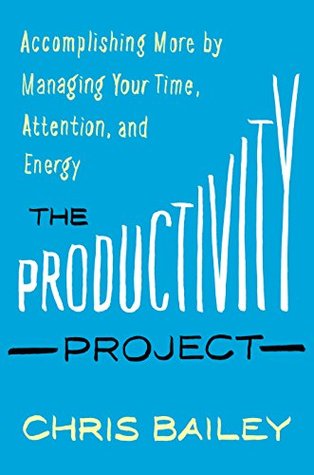More on this book
Community
Kindle Notes & Highlights
by
Chris Bailey
Read between
August 5 - August 10, 2020
that when you work on autopilot, it’s virtually impossible to step back from your work to determine what’s important, how to think more creatively, how to work smarter instead of just harder, and how to take control over what you’re working on instead of working on the tasks that other people throw (or in most cases, email) your way.
productivity has nothing to do with how much you do, and everything to do with how much you accomplish.
getting enough sleep requires more time, but it boosts your energy and ability to manage your attention. Eliminating noise and distractions also takes time, but helps you manage your attention better because it provides you with more focus and clarity throughout the day. Changing your mindset takes energy and attention, but will let you get more done in less time.
I think the best way to measure productivity is to ask yourself a very simple question at the end of every day: Did I get done what I intended to?
Just because you know something to be true, doesn’t mean you’ll act on it—even though acting on what you know is exactly what you have to do in order to become more productive.
Productivity isn’t about doing more things—it’s about doing the right things.
At the beginning of every day, mentally fast-forward to the end of the day, and ask yourself: When the day is over, what three things will I want to have accomplished? Write those three things down. 2. Do the same at the beginning of every week.
Without becoming aware of how you currently spend your time, it’s hard to reflect on whether you’re acting in ways that match up with what your values and highest-impact tasks are.
“sometimes procrastination is just a symptom that your life just doesn’t match what you’re interested in and…maybe you should do something else.”
the more valuable your work, the more aversive it will be.
“The dread of doing a task uses up more time and energy than doing the task itself.”
the more you see yourself like a stranger, the more likely you are to give your future self the same workload that you would give a stranger, and the more likely you are to put things off to tomorrow—for your future self to do.
“It’s so easy to commit your future self to things your current self wouldn’t want to do,” he says. “We call this a ‘planning fallacy.’ ”
Even though humans have been around for two hundred thousand years, we have only been living by the clock for the last 175.
When you work consistently long hours, or spend too much time on tasks, that’s usually not a sign that you have too much to do—it’s a sign that you’re not spending your energy and attention wisely.
By controlling how much time you spend on a task, you control how much energy and attention you spend on it.
“Parkinson’s law” states that your work expands to fit the amount of time you have available for it.
If you don’t continually defend your time and attention against low-return tasks, projects, and commitments, your life can easily become flooded with low-return activities.
Constantly trying to do more things—instead of the right things—leads to more stress, poorer quality of work, and lower productivity.
In an apartment or condo, I don’t have to mow the lawn, take out the trash, shovel snow, or even repair my appliances when they break. Owning a home isn’t a commitment I care enough about to sacrifice the time I can now spend on better things.
as powerful as our brains are, the latest neurological research shows that our brains are terrible at consciously processing more than a few thoughts at once.
Your mind is an insanely powerful thinking machine, but it’s the wrong place to store everything you have to get done, because it’s simply not built for that purpose.
“Your head is not for holding ideas—it’s for having ideas.”
“The first thing to do is to capture what’s got your attention, then decide if it’s actionable or not, and if it is, decide what the next action on it is, and do the action right then if you can.”
is this something I’m actually going to do something about?”
Just because you feel productive doesn’t mean you actually are—and
It’s crucial to rise up above your daily life every once in a while so you can see it from a new, more distanced perspective. And doing so lets you adjust course and make changes if you need to.
One hour of intense focus on your work is worth two or three hours of focusing on your work 53 percent of the time.
Productivity isn’t about doing more, faster—it’s about doing the right things, deliberately and with intention.
“Multitasking creates a dopamine-addiction feedback loop, effectively rewarding the brain for losing focus for constantly searching for external stimulation.”
Investing in your productivity is a worthwhile goal, but life is too short to not be kind to yourself in the process.
when your brain is happier, it “performs significantly better than it does at negative, neutral, or stressed. Your intelligence rises, your creativity rises, [and] your energy levels rise.”
recalling three things you’re grateful for, and journaling one positive experience you had at the end of each day.
recalling three things you’re grateful for every day is powerful because “as you consciously practice scanning for positives, your brain gets better at it and it retains the new pattern of unconsciously continually scanning the world for the good.”
The next time you’re facing a challenge and are looking around for someone to lean on, try leaning on yourself. What advice would you give yourself in your situation?
The kinder you are to yourself as you become more productive, the more productive you will become.


